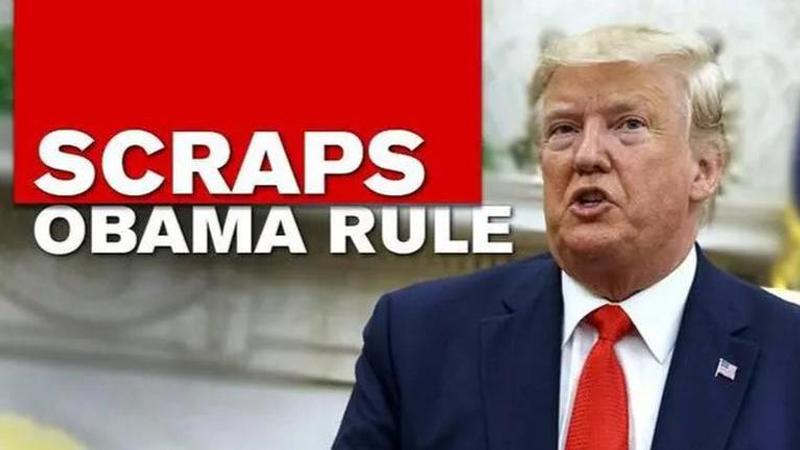Published 17:57 IST, March 16th 2020
Donald Trump administration ends Obama-era water rule, experts scoff
Donald Trump has scrapped Obama-era water protection rule in the US as Trump's move gets criticism from experts. The 2015 rule had faced several legal issues.

The Trump administration on Thursday has revoked an Obama-era regulation that shielded many U.S. wetlands and streams from pollution but was opposed by developers and farmers who said it hurt economic development and infringed on property rights.
Environmental groups criticized the administration's action, the latest in a series of moves to roll back environmental protections put into place under President Barack Obama.
What is water protection rule?
The 2015 Waters of the United States rule defined the waterways subject to federal regulation. Scrapping it "puts an end to an egregious power grab, eliminates an ongoing patchwork of clean water regulations and restores a longstanding and familiar regulatory framework," Environmental Protection Agency chief Andrew Wheeler said at a news conference in Washington, D.C. Wheeler and R.D. James, assistant secretary of the Army for civil works, signed a document overturning the rule and temporarily restoring an earlier regulatory system that emerged after a 2006 ruling from a sharply divided Supreme Court. The agencies plan to adopt a new rule by the end of the year that is expected to define protected waterways more narrowly than the Obama policy.
The Clean Water Act requires landowners to obtain federal permits before developing or polluting navigable waterways such as rivers and lakes. But disputes have long persisted over what other waters are subject to regulation — particularly wetlands that don't have a direct connection to those larger waters, plus small headwater streams and channels that flow only during and after rainfall.
Experts scoff at decision
Environmentalists contend many of those smaller, seemingly isolated waters are tributaries of the larger waterways and can have a significant effect on their quality. Denying them federal protection would leave millions of Americans with less safe drinking water and allow damage of wetlands that prevent flooding, filter pollutants and provide habitat for a multitude of fish, waterfowl and other wildlife, they said. "By repealing the Clean Water Rule, this administration is opening our iconic waterways to a flood of pollution," said Bart Johnsen-Harris of Environment America. "The EPA is abdicating its mission to protect our environment and our health."
Wheeler said regulators had gone far beyond the intent of Congress under the 1972 clean water law. "The 2015 rule meant that more businesses and landowners across the U.S. would need to obtain a federal permit to exercise control over their own property, a process that can cost tens of thousands of dollars and take months or even years to complete," he said. "It also put more local land-use decisions in the hands of unelected bureaucrats. Many Americans balked at this idea, and rightfully so."
President Donald Trump had ordered the EPA and Army Corps to develop a replacement policy that has a more restrictive definition of protected wetlands and streams. The Natural Resources Defense Council (NRDC) said the administration's action would be challenged in court. "The Clean Water Rule represented solid science and smart public policy," the group said in a statement. "Where it has been enforced, it has protected important waterways and wetlands, providing certainty to all stakeholders."
Obama-era rule faced issues
Zippy Duvall, president of the American Farm Bureau Federation, said the 2015 rule had generated a greater sense of urgency among its membership than any other issue."When you take the private property rights from a man that's worked all his life ... to grow the food and fiber for all of us to sit down and enjoy three times a day, it's something he just can't stand," Duvall said.
But Laura DeYoung, who runs a small sheep farm near Peninsula, Ohio, said she favored federal oversight to protect Lake Erie, where agricultural phosphorus runoff is blamed for large algae blooms."Nothing in the Obama regulations that came out prevented me from farming the way I was previously farming," she said.
The question of which waters are covered under the Clean Water Act has inspired decades of lawsuits and numerous bills in Congress. The United States Supreme Court in 2006 produced three differing opinions, leading the Obama administration to craft its rule. It provided federal oversight to upstream tributaries and headwaters, including wetlands, ponds, lakes, and streams that can affect the quality of navigable waters. The regulation faced quick legal challenges from 31 states and court rulings blocking its implementation in some. It was effective in 22 states, Washington, D.C., and U.S. territories before Thursday's action.
Betsy Southerland, who was the Director of Science and Technology in EPA's Office of Water during the Obama administration, said revoking its policy would create further regulatory confusion. "This repeal is a victory for land developers, oil and gas drillers and miners who will exploit that ambiguity to dredge and fill small streams and wetlands that were protected from destruction by the 2015 rule because of their critical impact on national water quality," Southerland said. Sen. John Barrasso, a Wyoming Republican and chairman of the Senate Committee on Environment and Public Works, applauded the Trump administration move, saying the Obama rule "would have put backyard ponds, puddles, and prairie potholes under Washington's control." Democratic Rep. Dan Kildee of Michigan, where two disputes over federal wetlands permits led to the 2006 Supreme Court case, said Trump "has decided to weaken protections for our water and reward corporate polluters."
Updated 17:57 IST, March 16th 2020




